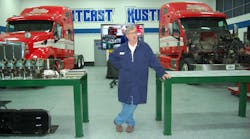MOORESVILLE, NC – To prove that its recycled and re-refined EcoPower engine oil can withstand the long-term wear-and-tear dished out by trucking operations, Safety-Kleen subjected it to million-mile test that’s lasted nearly five years with the help of Cooke Trucking Co. – revealing the results here at a special event held at the headquarters of vehicle repair and modification specialist Outcast Kustoms.
“Our objective with this test is to open the eyes of fleet decision makers,” Curt Knapp, senior VP and chief marketing officer for Safety-Kleen, explained to Fleet Owner.
“The real selling point for our recycled and re-refined engine oil is its potential role in corporate sustainability strategies, as it can help them reduce their carbon footprint. Fleets and their customers alike are demanding help in this area,” he said. “But we must also satisfy the demands of the fleet manager. We know we need to be competitive on price and service, but also in terms of engine protection as well.”
Safety-Kleen engaged the services of third-party test firm Infineum back in 2008 to put the EcoPower engine oil through its paces. Infineum then tapped Mount Airy, NC-based Cooke for two of its Peterbilt 387 tractors equipped with Cummins ISX 455-hp 15-liter engines to be the test vehicles, with each of those trucks in coast-to-coast team driver operation to maximize mileage.
Pat Fetterman, Infineum’s industry liaison advisor, said those two tractors typically accrued 6,000 miles round trip, loaded out to 65,000-lbs. with mixed dry goods – mainly furniture – in reefer trailers to the West Coast, while carrying 80,000-lbs. worth of produce back east.
To beef up the severity of the test, Infineum set the drain interval for the EcoPower engine oil at 40,000 miles – nearly double the 25,000 drain interval recommended by Cummins. Infineum also sampled the EcoPower oil in both trucks at 15,000, 25,000 and when drained at 40,000 miles for analysis to ensure the lubricant performed as expected.
At the teardown performed at Outcast Kustoms location, Fetterman noted that the engine components from both of Cooke’s tractors “looked exceptionally good for one million miles of use,” adding that “they look like what I’d expect them to look like if good maintenance practices were combined with a premium ‘virgin’ engine oil in this type of service.”
[Video of Fetterman’s comments can be viewed by clicking here.]
By “good,” Fetterman meant that the engine pistons and lining showed little wear, with no cracks on any of the valve intake rocker arms, among other important metrics. In short, he noted that Infineum plans to reconstruct the engines with the existing parts – not replacing any components, other than the oil filter – replacing them in the tractors for eventual sale on the used vehicle market.
Fetterman also pointed out that little to no wear occurred despite the heavy soot loading of the oil from heavy use of exhaust gas recirculation (EGR) technology. As both the engines used to test EcoPower were 2007-compliant, the oil would carry a 4% to 6% load of soot in suspension by the time it reached the 40,000 drain point.
In other words, he said, as a full 13 gallon “charge” of engine oil equates roughly to 104 lbs. in weight, the oil would loaded down with 6 lbs. of soot by the time it got changed.
“That’s pretty astounding, considering the EcoPower oil still provided proper wear protection for the engine,” Fetterman noted.
He added that both of the engines in the test trucks suffered two EGR cooler failures over the life of the test – the first between 200,000 and 300,000 miles, with the second between 700,000 and 800,000 miles – necessitating the replacement of the diesel particulate filter (DPF) as well, since escaping steam from the busted EGR coolers damaged the fragile chemical substrates used in the DPF device to clean up the engine’s exhaust stream.
“Even despite all of that, these trucks still averaged 6.2 mpg over their duty cycle,” Fetterman said. “Based on everything I’ve seen from this test, the oil drain interval could be pushed out to 50,000 miles and engine life could be extended beyond 1 million miles.”
And those findings are just some of the reasons why Safety-Kleen wanted to conduct such a long-term test, stressed Knapp.
“There are a lot of myths that basically boil down to this: that recycled and re-refined engine oil simply isn’t as good as what’s made from original petroleum base stock,” he explained. “We think this test shows that isn’t the case at all.”



